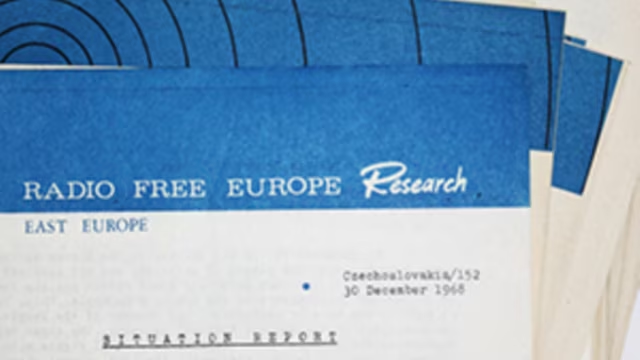Seven RFE/RL Collections Now Online At Open Society Archives

RFE/RL and the Open Society Archives are pleased to announce that seven major Radio Free Europe/Radio Liberty collections are now online in its Digital Repository. Together, these collections make the majority of OSA’s RFE/RL holdings available online for the first time, totaling 103,265 items — 3,874 videos, 372 images and 99,019 documents — documenting Cold War history from as early as 1951 up until 1994. These unique materials provide invaluable insights into life under Communism in the USSR and across the former Soviet bloc, as well as the scope of RFE/RL’s monitoring, research and analysis activities.
The digitization and cataloging of these collections have been completed under the three-year European Union project, the Heritage of the People’s Europe (HOPE) which ended on May 1, 2013. The project brought together a best practice network across ten countries working in close cooperation with the multilingual Europeana discovery portal to provide a single access point to cultural heritage collections available digitally at participating domains, libraries, archives and museums. Using proven open source technologies, the end result is a shared object repository to store digital collections for the long term. HOPE materials are also available together with additional social history collections indexed by theme at the Social History Portal. The HOPE project was supported through the European Union Competitiveness and Innovation Framework ICT Policy Support Programme on Digital Libraries.
The Radio Free Europe Information Items collection contains 70,292 digitized Information Item reports produced by RFE’s News and Information Department in eight languages from 1951 to 1956. Based mostly on transcripts of interviews held in RFE field offices with émigrés, defectors, and people traveling to the West as tourists or on business, the collection presents unofficial information and intelligence on subjects ranging from Party and state apparatus organization and conflicts, macro-economics and working conditions, to the informal economy, surveillance practices, corruption, nightlife, and subversion.
Studies produced by RFE research units on the domestic and international affairs of Communist states, as well as trends and developments in the Communist movement worldwide, are held in the Radio Free Europe/Radio Liberty Background Reports collection, which contains 18,224 digitized reports produced in English from 1952 to 1992, spanning brief assessments of new developments in the Communist bloc, to research papers providing detailed context and analysis. The products of RFE/RL’s extensive media monitoring activities and journalistic research can be found in the Radio Free Europe/Radio Liberty Situation Reports collection, which contains 9,283 English-language reports released between 1959 and 1989, focusing on current affairs in the five countries RFE broadcast to, Bulgaria, Czechoslovakia, Hungary, Poland, and Romania, as well as Albania, the Baltic States and Yugoslavia.
Radio Free Europe/Radio Liberty Hungarian Radio Monitoring contains 1,072 digitized daily transcripts of news and current affairs programs broadcast on two Hungarian state radio stations, Kossuth and Petőfi, from January 1, 1988 to December 31, 1990. These transcripts illustrate how, over this period of profound political change, public radio broadcasting in Hungary was transformed into a powerful actor in shaping the democratization process.
RFE’s Polish Underground Publication Unit monitored and preserved a huge range of samizdat publishing activities in Poland throughout the 1980s, gathered together in two Polish collections. The Polish Underground Ephemeracollection contains 372 digitized objects produced between 1981 and 1990, including stamps, envelopes, postmarks and postcards, calendars, photos, fliers, posters and fake banknotes. These rare materials, which feature clearly recognizable political and religious imagery, helped raise funds and quickly became popular collectors’ items. The Radio Free Europe/Radio Liberty Publications Based on Polish Underground Press collection comprises 149 items produced in English and Polish between 1984 and 1990, bi-weekly press summaries, translated Samizdat articles and monthly reviews, dealing with topics such as the underground Solidarity movement, political prisoners, cultural dissent, the role of the Catholic church and attitudes towards Eastern and Western neighbors.
Totaling almost 840 hours of footage, the Soviet and Russian Television Monitoring collection contains 3,874 videos produced in Russian and eight other languages between 1985 and 1994 by Central Television of the Soviet Union and Russian Television Ostankino, and recorded by RFE/RL’s Monitoring Unit and the Moscow agency What the Papers Say. The selected programs portray different aspects of life in the Soviet Union and Russian Federation in the late 1980s and early 1990s, with a focus on contemporary key social, political, and economic issues before, during and after the collapse of the Soviet Union, including independence movements, the establishment of a multi-party system in Russia, and economic reform and privatization.
Within the HOPE project, the digitization of OSA’s RFE/RL collections represents a significant advance in making RFE/RL’s pivotal role and work throughout four decades of Cold War history, monitoring, researching and documenting life in the ‘People’s democracies’, from state-run media to first-hand accounts and underground publishing, available online to researchers and the broader public for the first time.
—-
For more information, contact:
Gabriella Ivacs, Chief Archivist
Open Society Archives at Central European University
Email: ivacsg@ceu.hu
Tel: +36.1.327.3250